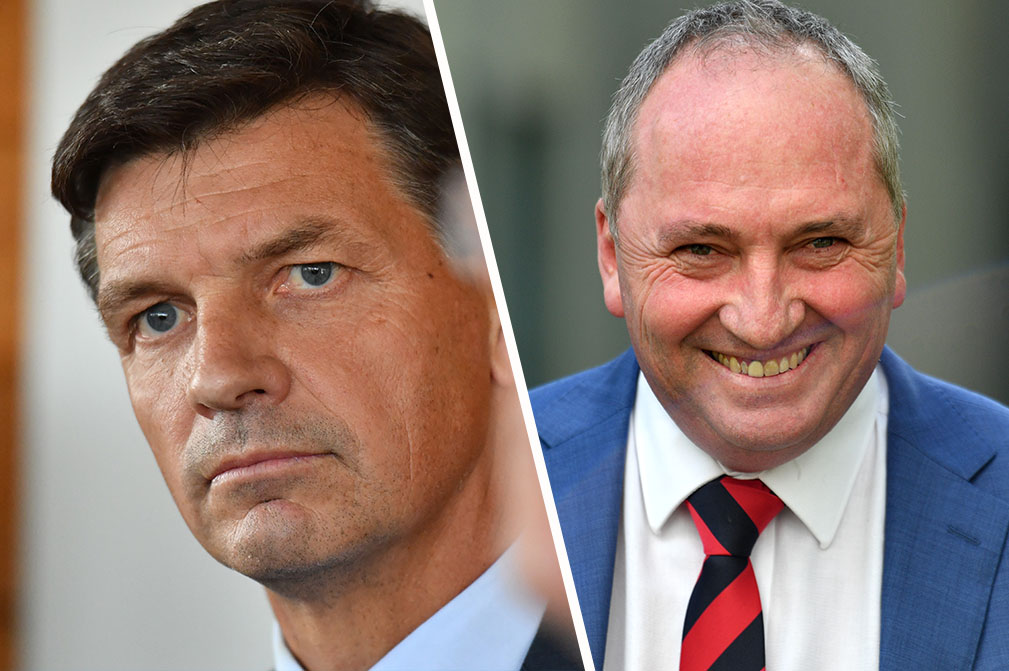
Energy Minister Angus Taylor is threatening to sue people for tweeting and Barnaby Joyce is losing his mind on the radio and it’s not over immigration, or global warming, or death taxes, or anything politics wants you to pay attention to ahead of the federal election. Nope, it’s all about water. Delicious (and apparently very expensive) water.
Companies in the Cayman Islands, big money deals, and calls for a royal commission: what exactly is going on?
It all starts with the Murray-Darling Basin, the main water source for the country, and the process of water buybacks.

A water buyback involves the government paying companies for rights to water. This usually involves water that irrigators are using on farms.
Basically, we don’t have enough water to sustain how much we use, so the government capped how much water is taken out and traded.
Farmers buy and sell water, just like a car or houses or anything else. The government can buy this water (and often does) in an effort to leave water exactly where it is. In concept, the government is buying water from farmers to stop them using it on their farms. Think of it as putting water in the bank, but the bank is our environment and land and water supply that we rely on to, uh… live.
Trading water is a vital business process for many: the market allows groups to buy and sell based on their needs, and it’s an industry worth about $2 billion a year.
But it’s one buyback in particular that has made headlines the past few weeks.
The $79 million dollar water buyback that has people asking questions.

That’s right: the government spent almost $80 million dollars on water. And that money came from you, the taxpayer.
If that seems like a lot, that’s because it is: the 2017 sale of all that water went to a company called Eastern Australia Agriculture (EAA). It’s is the highest price ever paid – and EAA made $52 million dollars profit on the sale.
This whole purchase was made without an open tender process. That means there was no process where any qualified group could bid on the water – rather, the government stumped up the millions of dollars without anyone being able to underbid them. These were ~private~ negotiations.
This matters for a bunch of reasons, but mostly because of the sheer scope of the deal, one many have said is way, way, wayyyyyyy overpriced. Some reports say the price was 85% higher than in other, similar deals.
This deal is also for “overland flow“, which is essentially flood water that can only be used on your irrigation property. Overland flow isn’t water that has gone into the soil in normal farming operations, or water collected from rainwater tanks. When you buy overland flow, you’re buying the right to use that water for irrigation purposes. That’s about it.
When you buy “overland flow” water, you’re buying water that can be used on your farm, and water that only exists when there’s a flood.
What’s Angus Taylor (allegedly) got to do with it?

A few weeks ago some journalists and members of the public received notices from Angus Taylor’s lawyers threatening to sue them for sharing a Twitter thread that was “grossly and indefensibly” defamatory of him. The thread contains many accusations – all of which Taylor strongly denies – relating to alleged corruption surrounding the $80 million deal.
Taylor was director and secretary of Eastern Australia Agriculture, the company which made big bank from the sale, from 2008 to 2009. He stepped down from his role at EAA at the end of ’09, well before entering Parliament, and his lawyers told BuzzFeed News he has had no direct or indirect financial interest in the company at any time.
But then it gets more complicated.
Eastern Australia Agriculture is wholly owned by Eastern Australia Irrigation (EAI) – a company registered in the Cayman Islands, and one that made loans to EAA with huge interest obligations (according to The Project, around 20%).
Update: In a strongly worded statement received today, a spokesperson for Mr Joyce told The Project: “Mr Joyce had no role in determining either the price or the vendor, nor the classification of any purchase of a water entitlement in this area. Cont: https://t.co/l7rzdiLSY4
— The Project (@theprojecttv) April 21, 2019
On his official government website, Taylor lists EAI as a company he co-founded, as well as serving as EAI’s director. Asked about the company by Network Ten, Taylor said he was no longer part of the corporation.
“There is no basis in fact on some of the claims that have been made and I have no further comment to make on them,” he said. “I have no involvement in that company and nor does my family.”
What about Barnaby Joyce?

He has been characteristically chill about all of this argy-bargy being in the news. On Monday evening, Joyce spoke to the ABC‘s Patricia Karvelas, calling any claims that the water buyback was suss “an absolute load of horse poo.”
Joyce claimed Queensland‘s state Labor government had pushed for the sale, saying he had “absolutely nothing to hide,” and said the owners of the company that sold the water were “irrelevant.”
“You’re asking if they have water to sell, you’re not asking them what clothes they wear or who they are married to,” he said. “I’ve heard it’s a trust fund in the Cayman Islands. There you go. That’s what the Queensland government should have told me.”
Joyce said he wasn’t responsible for negotiating price or the vendor, leaving that up to the Department of Agriculture and that he trusted it to “do the right thing.”
“These were the people who were offering water to us to buy,” he said.
Facing calls for a royal commission from Greens leader Richard Di Natale, Joyce said he’d be happy to answer questions. “I wouldn’t give a toss,” he said. “Whatever boat I am in is the boat Penny Wong is in.”
Penny Wong? Yep. Here’s how the Labor Party’s current leader in the senate got dragged into this mess:

- Barnaby Joyce argues that Penny Wong, who was the Minister for Climate Change, Energy Efficiency, and Water when Labor were in government, also made deals with foreign companies (which isn’t illegal) and also the EAA.
- Joyce has also taken aim at Labor’s Tony Burke, who has also been critical of the deal.
- Labor did deal with EAA, however, it says the process implemented by the government during Wong’s time in charge of water was open tender.
There’s a good fact check from The Guardian here.
Basically, Kevin Rudd‘s Labor government purchased water through an open tender process.
That process involved advertising a valley where it wanted to buy water and would invite farmers to suggest a price. The lowest price would be what the government ended up on.
When Barnaby Joyce came into town as Minister for Water things changed, with the government deciding it would only be buying water from companies willing to sell. The government doesn’t have to go through open tender if there are “exceptionally advantageous conditions” surrounding the asset.
Oh also: on Monday, it also came out that EAA donated $55,000 to the Liberal Party before the 2013 election.
What’s Labor doing?

Labor’s water spokesman Tony Burke has asked for the government to publish documents surrounding the value of the deal.
Here’s the letter I sent today to the Department of Agriculture seeking the release of documents they referred to in an extraordinary media release last Saturday. #auspol #watergate pic.twitter.com/hYYCKNTRCh
— Tony Burke (@Tony_Burke) April 22, 2019
He wants to see any advice the Department of Agriculture and Water Resources received from the Murray-Darlin Basin Authority, the State Government, and the Commonwealth Environmental Water Holder.
Burke has asked for a response by the end of Tuesday.
For Labor, the water drama offers a pretty good opportunity to go after the Coalition amidst an increasingly aggressive election campaign.
What about the government? What about ScoMo?

On Tuesday the government referred the water buyback to the federal Auditor-General.
Agriculture Minister David Littleproud said he asked the AG to look at all of the water buybacks since 2008, covering deals done by both the Labor and Coalition governments.
Prime Minister Scott Morrison – who would probably rather be talking about getting a go so you can give a go – told the Today Show on Tuesday that Labor had bought water from the EAA as well.
Morrison has also insisted that all deals done by Joyce were made “totally on advice by his department” with negotiations taking place “at arm’s length”.
That has caused quite a few people to point out comments Joyce made in 2015, when he was adamant that the responsibility for water management rested with him.
“There is not one thing that can go through Cabinet without the cabinet minister responsible having the say. I’m actually responsible for it if it goes wrong. Responsibility resides with me,” he said.
So that’s where we are now.

A lot of denial and a lot of confusion, and a lot of people struggling to understand our nation’s multi-billion dollar water sales industry (including me.)
Hopefully this all helped to unpack a few things – no doubt it will be all the more confusing tomorrow.



